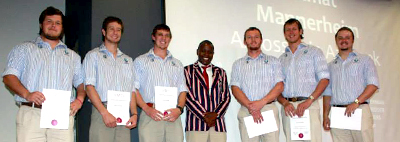 |
Anesu Ruswa with the students from the Heimat Association at the appreciation ceremony.
6 September 2013
Photo: Damane Muzi Gwebu |
Over 290 certificates were recently awarded to students by the Associations and Dialogue Office. The students received recognition for the crucial role that they play in student leadership.
This appreciation function was the brainchild of Anesu Ruswa, who is the former chairperson of the office. “I realised that the executive committees of various student associations do a lot for the general student community, with neither recognition nor recompense – so I decided to change that. The appreciation function was a first step in recognising associations as incubators of future leaders and hubs of the student-life experience,” he says.
Anesu, who has served in the associations’ office for two consecutive years, says that a highlight for him in the past year was the lessons of organisation and professionalism that he learnt from his administrative executive committee. “We set up systems and structures in the Associations’ office which, with all humility, no other portfolio can match.”